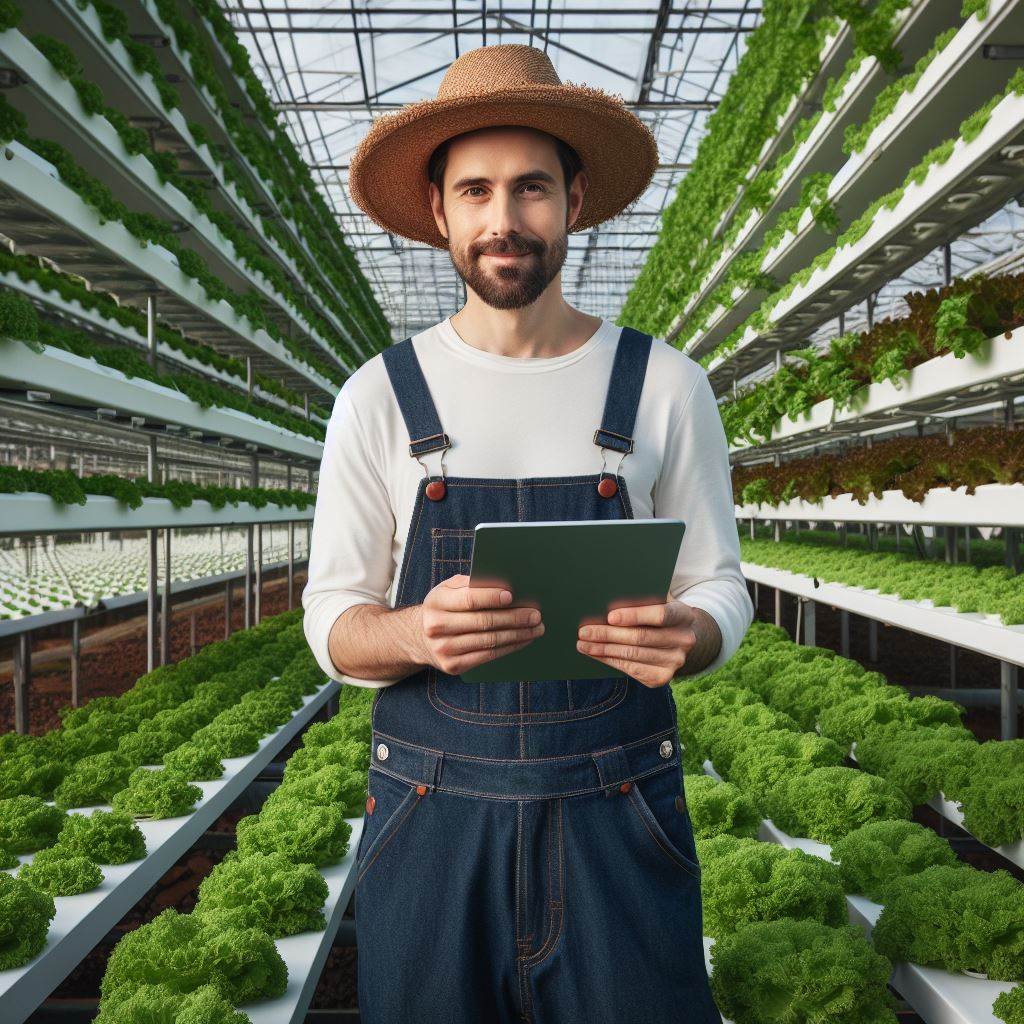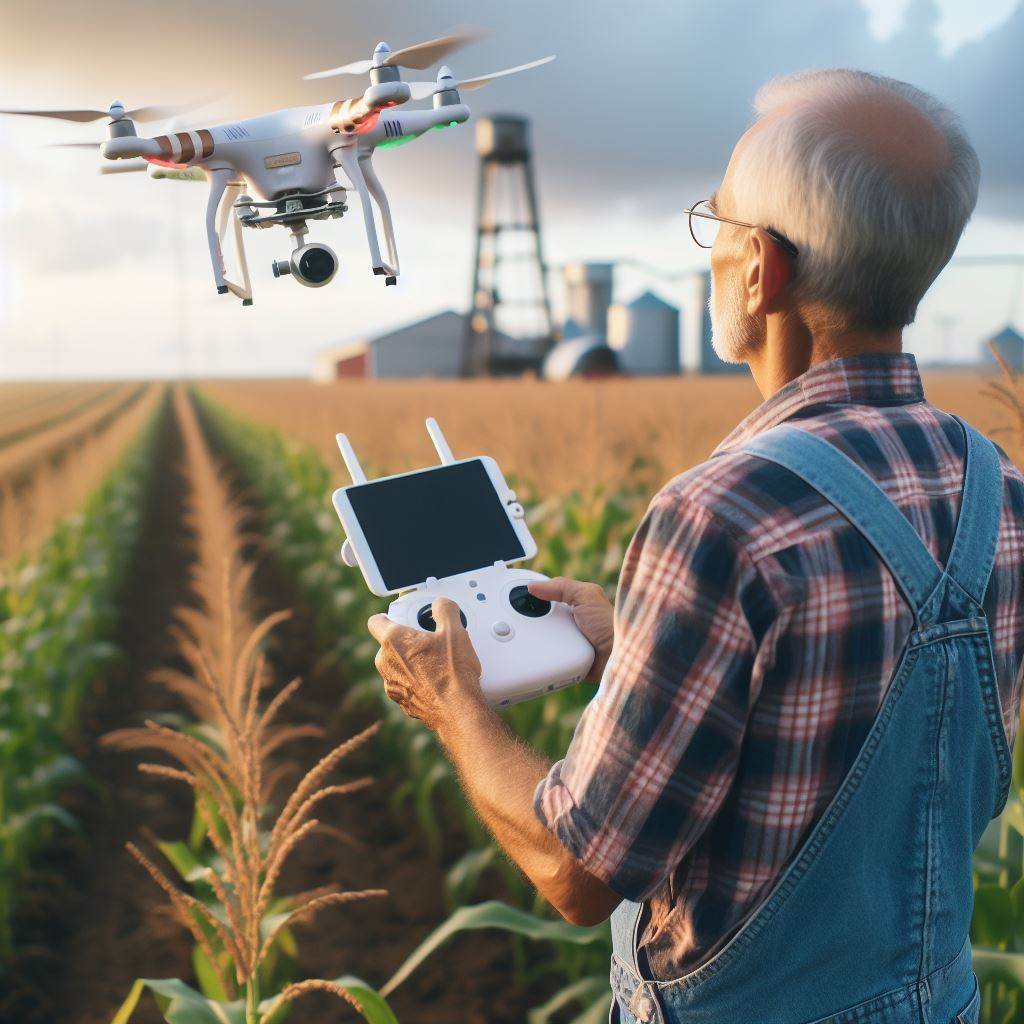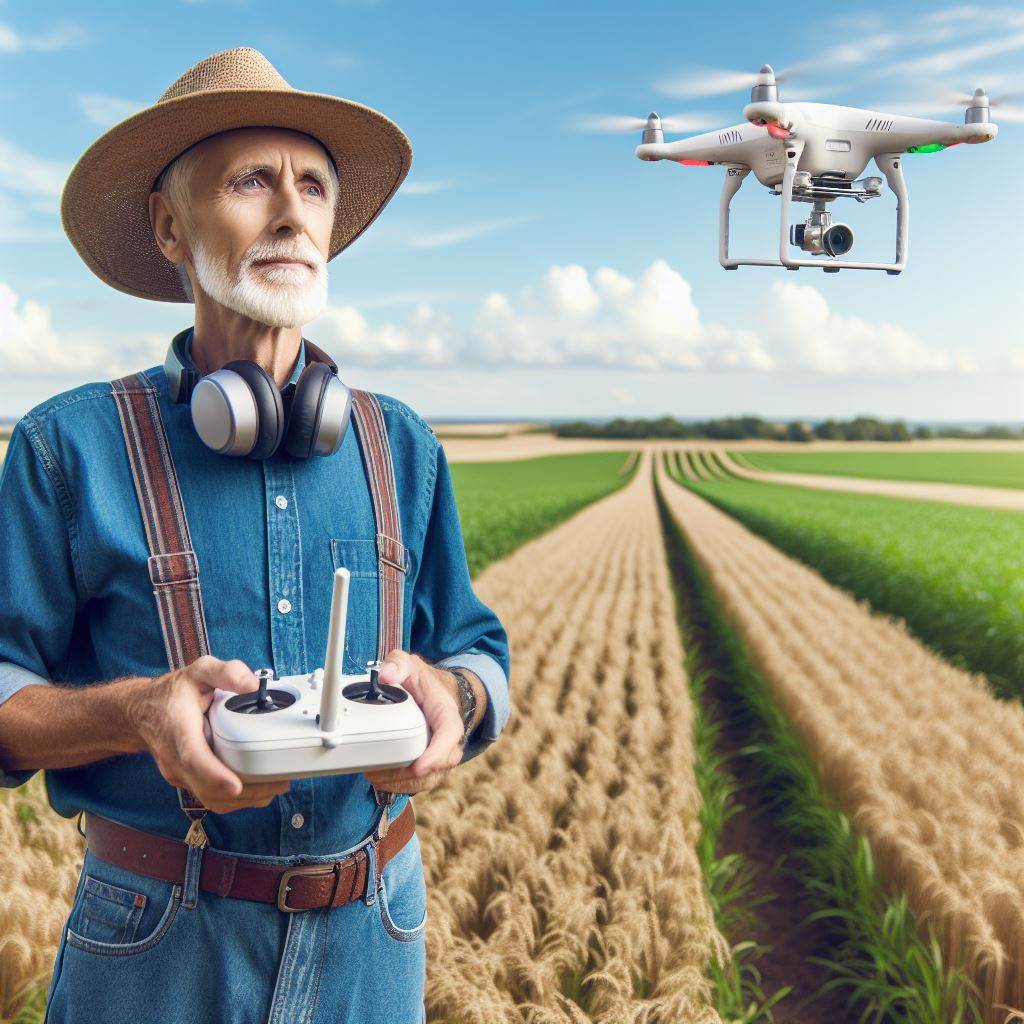Introduction
Sustainable farming is an approach to agriculture that aims to meet the needs of the present without compromising the ability of future generations to meet their own needs.
It involves using farming techniques that promote long-term productivity while preserving the environment.
In today’s world, sustainable farming is of utmost importance.
With a rapidly growing global population, it is essential to ensure food security for everyone.
Sustainable farming practices help achieve this by maximizing crop yields, conserving soil and water resources, and minimizing the use of chemicals and pesticides.
This not only ensures the availability of food but also protects the health and well-being of consumers.
Agri-tech plays a crucial role in sustainable farming. It involves the use of technology, such as sensors, drones, and smart irrigation systems, to improve agricultural practices.
These technologies help farmers monitor and optimize crop growth, manage pests and diseases, and reduce water and fertilizer usage.
By harnessing the power of data and analytics, agri-tech enables farmers to make informed decisions and maximize productivity while minimizing their impact on the environment.
In short, sustainable farming and agri-tech go hand in hand in addressing the challenges faced by modern agriculture.
Embrace sustainable farming and leverage agri-tech innovations for a resilient food system, safeguarding the environment and meeting future generations’ needs.
Benefits of Sustainable Farming
Sustainable farming practices bring numerous benefits to various aspects of our society and the environment.
This section explores the benefits of sustainable farming, including environmental, economic, and social advantages.
Environmental benefits
Reduction in chemical use
One of the key advantages of sustainable farming is the reduction in chemical use.
Unlike conventional farming methods, sustainable farming minimizes the application of synthetic pesticides and fertilizers.
Transform Your Agribusiness
Unlock your farm's potential with expert advice tailored to your needs. Get actionable steps that drive real results.
Get StartedThis helps to prevent chemical runoff, which can contaminate water sources and harm ecosystems.
Preservation of soil health
Sustainable farming also focuses on preserving soil health.
By implementing practices like crop rotation, the soil’s fertility and structure can be maintained.
Healthier soils are more resistant to erosion and can retain nutrients better, leading to improved crop growth and long-term sustainable production.
Conservation of water resources
Conserving water resources is another crucial environmental benefit of sustainable farming.
Through techniques like precision irrigation and rainwater harvesting, farmers can efficiently manage water usage on their lands.
This not only reduces water waste but also helps to mitigate the effects of drought and water scarcity.
Economic benefits
Lower production costs
Sustainable farming practices offer several economic advantages for farmers. One significant benefit is lower production costs.
By reducing chemical inputs and adopting resource-efficient methods, farmers can save on expensive chemical purchases and reduce their overall production expenses.
Increased productivity
Increased productivity is another economic benefit of sustainable farming.
Through sustainable practices such as organic farming and integrated pest management, farmers can improve crop yields without compromising the long-term health of their fields.
This leads to higher overall productivity and profitability.
Access to premium markets and higher prices
Furthermore, sustainable farming provides farmers with access to premium markets and higher prices for their produce.
Consumers increasingly value sustainably produced food, and many are willing to pay a premium for products that adhere to sustainable farming practices.
This opens up new opportunities for farmers to tap into lucrative niche markets, leading to increased income and market stability.
Social benefits
Improved livelihoods for farmers
- The advantages of sustainable farming extend beyond the environment and economy.
- Sustainable farming practices contribute to improved livelihoods for farmers.
- By reducing production costs and increasing productivity, farmers can achieve higher profits and a more sustainable income.
- This, in turn, improves their quality of life, providing them with financial stability and better opportunities for growth and development.
Food security for future generations
- Sustainable farming also plays a vital role in ensuring food security for future generations.
- By adopting sustainable practices, farmers can maintain soil fertility, conserve water resources, and protect biodiversity.
- These measures contribute to the long-term sustainability of agricultural systems, enabling future generations to have access to nutritious and abundant food
Reduced impact on rural communities
- Additionally, sustainable farming practices have a reduced impact on rural communities.
- By minimizing the use of harmful chemicals and focusing on long-term sustainability, these practices help maintain a healthy and favorable environment for rural communities.
- This fosters biodiversity, supports local ecosystems, and preserves the cultural heritage associated with rural areas
In summary, sustainable farming brings a wide range of benefits to the environment, economy, and society.
From reducing chemical use and conserving resources to improving farmers’ livelihoods and ensuring food security, sustainable farming practices contribute to a more sustainable and resilient future for all.
Read: Innovative Agri-Tech: Drones Changing Agriculture
Overview of Agri-Tech in Sustainable Farming
Definition of agri-tech and its significance
Agri-tech refers to the innovative use of technology in agricultural practices to improve efficiency, productivity, and sustainability.
Its significance lies in addressing the challenges faced by traditional farming methods, such as resource scarcity and environmental degradation.
Examples of agri-tech in sustainable farming
Precision agriculture
Precision agriculture involves the use of data and technology to optimize farming practices.
It includes techniques like GPS and remote sensing to gather information about soil conditions, crop growth, and pest presence.
This data is then used to make informed decisions regarding fertilization, irrigation, and pest control, minimizing resource wastage and enhancing productivity.
Vertical farming systems
Vertical farming is a method that utilizes vertically stacked layers to grow crops in indoor environments.
Showcase Your Farming Business
Publish your professional farming services profile on our blog for a one-time fee of $200 and reach a dedicated audience of farmers and agribusiness owners.
Publish Your ProfileThis allows for year-round cultivation regardless of external climate conditions.
Vertical farming systems often incorporate LED lights, hydroponic or aeroponic systems, and advanced climate control technology to provide optimal growing conditions.
These systems maximize land use and reduce water consumption, making them highly sustainable.
Use of drones for monitoring and surveillance
Drones equipped with cameras and sensors are used in farming to monitor crops, collect data, and identify potential issues.
They can quickly analyze large areas of farmland, identifying crop stress, nutrient deficiencies, or pest outbreaks.
This allows farmers to take prompt action, target specific areas for treatment, and minimize the use of pesticides or fertilizers, resulting in cost savings and reduced environmental impact.
Internet of Things (IoT) applications
The IoT involves the interconnection of devices and sensors to collect and share data.
In sustainable farming, IoT applications enable real-time monitoring and automation of various processes.
For example, sensors can measure soil moisture and send alerts to farmers’ smartphones, enabling precise irrigation.
IoT can also monitor and regulate temperature, humidity, and ventilation systems in greenhouses, optimizing crop growth conditions.
By providing accurate and timely information, IoT improves resource management and overall farm productivity.
Advanced biotechnology for crop development
- Agri-tech incorporates advanced biotechnology techniques to enhance crop characteristics and overcome limitations.
- Genetic modification allows for the development of crops that are resistant to pests, diseases, or extreme environmental conditions.
- Biotechnology also enables the production of crops with improved nutritional profiles and reduced reliance on chemical inputs.
- These advancements generate higher yields, contribute to food security, and reduce the environmental footprint of agriculture.
In a nutshell, agri-tech plays a crucial role in sustainable farming by combining technology and agricultural practices.
Precision agriculture, vertical farming, drones, IoT applications, and advanced biotechnology all enhance resource efficiency, minimize environmental impact, and ensure food security.
Embracing agri-tech is vital to meet the challenges posed by a growing population and diminishing resources while striving for sustainable and productive agricultural systems.
Read: Agri-Tech and Big Data: Transforming Farm Management

How Agri-Tech is Enhancing Sustainable Farming Practices
Agri-tech, the application of technology in agriculture, is revolutionizing sustainable farming practices.
Through the utilization of advanced tools and techniques, farmers can now enhance resource management, increase productivity, and reduce their environmental impact.
Improved resource management
- Precision use of fertilizers and pesticides to minimize waste and maximize effectiveness.
- Efficient irrigation practices to conserve water and maintain optimal soil moisture levels.
- Energy conservation through automation of tasks such as monitoring and controlling farm equipment.
Increased productivity and yield
- Genetic improvements in crop varieties to enhance resistance to pests, diseases, and environmental stressors.
- Enhanced pest and disease management through the use of advanced monitoring and preventive measures.
- Optimization of planting and harvesting processes to improve efficiency and maximize crop yield.
Reduced environmental impact
- Minimized chemical runoff and contamination by employing targeted application methods.
- Reduced greenhouse gas emissions through the use of precision farming techniques and sustainable energy sources.
- Preservation of biodiversity through the implementation of practices that support natural ecosystems.
Agri-tech is transforming sustainable farming practices by improving resource management, increasing productivity and yield, and reducing environmental impact.
With the precision use of fertilizers and pesticides, efficient irrigation practices, and energy-conserving automation, farmers can optimize their resource utilization.
Genetic improvements in crop varieties, enhanced pest and disease management, and the optimization of planting and harvesting processes contribute to higher productivity.
Agri-tech also enables the reduction of environmental impact by minimizing chemical runoff and greenhouse gas emissions while preserving biodiversity.
Overall, the integration of technology in agriculture empowers farmers to achieve sustainable and efficient farming practices for a better future.
Read: Future of Farming: AI and Machine Learning in Agri-Tech
Challenges and Limitations in Implementing Agri-Tech for Sustainable Farming
High initial investment and operational costs
Implementing agri-tech solutions requires a significant amount of upfront investment and ongoing operational expenses.
Farmers may struggle to afford the initial costs involved in adopting new technologies and techniques.
Moreover, the maintenance and operational costs associated with agri-tech systems can be high, including the need for regular software updates and equipment repairs.
This financial burden can deter farmers from embracing sustainable farming practices.
Limited access and knowledge in rural areas
One major limitation in implementing agri-tech for sustainable farming is limited access to these technologies in rural areas.
Advanced farm machinery, precision agriculture tools, and digital platforms may not be readily available or accessible in remote agricultural regions.
In addition, there may be a lack of knowledge and technical skills among farmers in these areas regarding the effective use of agri-tech solutions.
Limited access and knowledge hinder the widespread adoption of sustainable farming practices.
Ethical concerns related to genetically modified organisms (GMOs)
Genetically modified organisms (GMOs) are a contentious issue in sustainable farming.
While these organisms can enhance crop productivity and pest resistance, ethical concerns surround their potential environmental impact and effects on human health.
Many consumers are wary of consuming GMO products, and some farmers opt for traditional, non-GMO farming methods to meet consumer demands.
This reluctance to embrace genetically modified organisms poses a challenge to the widespread adoption of agri-tech solutions in sustainable farming.
Resistance from traditional farming communities
A significant challenge in implementing agri-tech for sustainable farming is resistance from traditional farming communities.
These communities often have deep-rooted traditions and practices that they are reluctant to abandon.
Adopting new technologies and farming methods may be seen as a threat to their way of life and identity.
Changing mindsets and convincing traditional farmers to embrace agri-tech solutions can be a long and challenging process.
Ultimately, while agri-tech holds great potential in achieving sustainable farming practices, several challenges and limitations need to be addressed.
Showcase Your Farming Business
Publish your professional farming services profile on our blog for a one-time fee of $200 and reach a dedicated audience of farmers and agribusiness owners.
Publish Your ProfileHigh initial and operational costs, limited rural access, knowledge gaps, ethical GMO concerns, and resistance from traditional farmers impede agri-tech adoption.
Read: Drones in Agri: Boosting Crop Efficiency
Conclusion
Agri-tech has emerged as a key driver of sustainable farming practices.
Through the development and implementation of innovative technologies, farmers can optimize their resources while minimizing environmental impact.
From precision agriculture techniques to drone technology and IoT applications, agri-tech is revolutionizing the way farming is conducted
Furthermore, collaborations and partnerships among agri-tech companies, farmers, researchers, and government agencies are crucial in driving innovation in the field.
By working together, stakeholders can share knowledge, resources, and expertise to develop and enhance sustainable farming practices.
This collaboration ensures that agri-tech solutions are practical, efficient, and aligned with real-world farming needs.
Therefore, the transformative potential of agri-tech in sustainable farming cannot be overstated.
With the ever-increasing global demand for food and the need to mitigate the environmental impact of agriculture, agri-tech offers practical solutions for the future.
By harnessing the power of technology, farmers can achieve higher yields, reduce waste, conserve resources, and contribute to a more sustainable and resilient food system.
All in all, agri-tech represents a paradigm shift in the agricultural industry, enabling farmers to embrace a more sustainable approach to food production.
Through the intersection of technology and farming, we have the opportunity to create a more efficient, environmentally friendly, and resilient food system for generations to come.




